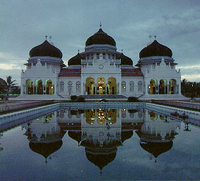DENPASAR, Indonesia -- Not very long ago, many observers considered Aceh, Indonesia's formerly war-torn separatist province, a success story. But a recent rise in political violence has led Indonesian President Susilo Bambang Yudhoyono and Aceh Governor Yusuf Irwandi to warn against potential spoilers of Aceh's peace process. Nobel Peace Prize laureate Martti Ahtisaari, who brokered the 2005 deal between the former secessionist Free Aceh Movement (GAM) and Jakarta, has also emphasized that a long-term resolution is far from ensured. Tucked in the westernmost corner of the Indonesian archipelago, Aceh's conflict ended in the aftermath of the December 2004 tsunami that killed 168,000 people. The tsunami destroyed large swathes of the province and dwarfed the political ambitions of both the insurgents and the Indonesian government, who had been at war for three decades. The immediate post-war period was indeed a grand success, crowned with local elections held in 2006. The election of Irwandi, himself a former GAM member, was lauded worldwide. A progressive disengagement by the international community followed, while the national political elite moved its attention elsewhere, apparently satisfied with the happy ending.
Aceh Peace Threatened by ‘Democracy Deficit’

